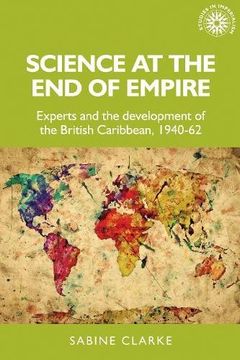Compartir
Science at the end of Empire: Experts and the Development of the British Caribbean, 1940-62 (Studies in Imperialism Mup) (en Inglés)
Sabine Clarke (Autor)
·
Manchester University Press
· Tapa Dura
Science at the end of Empire: Experts and the Development of the British Caribbean, 1940-62 (Studies in Imperialism Mup) (en Inglés) - Sabine Clarke
$ 57.056
$ 95.094
Ahorras: $ 38.037
Elige la lista en la que quieres agregar tu producto o crea una nueva lista
✓ Producto agregado correctamente a la lista de deseos.
Ir a Mis Listas
Origen: Estados Unidos
(Costos de importación incluídos en el precio)
Se enviará desde nuestra bodega entre el
Lunes 01 de Julio y el
Miércoles 10 de Julio.
Lo recibirás en cualquier lugar de Argentina entre 1 y 3 días hábiles luego del envío.
Reseña del libro "Science at the end of Empire: Experts and the Development of the British Caribbean, 1940-62 (Studies in Imperialism Mup) (en Inglés)"
This is the first exploration of Britain’s plans for industrial development in its Caribbean colonies. Historians have often denied that Britain ever had such hopes, but this book shows that, following revelations of serious deprivation during the 1930s, the Colonial Office launched a scheme to revitalise the region by using cane sugar as the raw material for making fuels, plastics and drugs. This volume shows the practical and political importance of scientific research and expert advice for the creation and implementation of Britain's colonial development plans after 1940. Laboratory research into finding industrial uses for sugar offered a means for the Colonial Office to intervene in the development of the Caribbean with minimal disturbance to market forces. Once knowledge had been produced, decisions about the commercial production of sugar-based compounds could be left to business. This vision of industrial development rejected state planning and control, and was far more liberal in character than the large, rational and highly regimented schemes that were often promoted for colonial Africa. Colonial Office attempts to persuade the colonies to take up its preferred route to industrialisation were made difficult however, by the growing autonomy of Caribbean governments as they approached independence. Additionally, American experts attached to the Caribbean Commission offered an alternative model of industrial development, based on the work of Puerto Rico’s development corporation. This book illustrates the competition between Britain and America to shape the future of the Caribbean region, in which the provision of information and expert advice assumed a crucial role. It brings to light forgotten ideas of sugar as an industrial raw material, and shows the importance of science in the colonies in the post-war period.
- 0% (0)
- 0% (0)
- 0% (0)
- 0% (0)
- 0% (0)
Todos los libros de nuestro catálogo son Originales.
El libro está escrito en Inglés.
La encuadernación de esta edición es Tapa Dura.
✓ Producto agregado correctamente al carro, Ir a Pagar.

